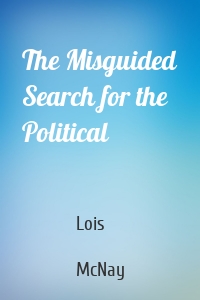Lois McNay
3 кн.
The Misguided Search for the Politi...
There has been a lively debate amongst political theorists about whether certain liberal concepts of democracy are so idealized that they lack relevance to ‘real’ politics. Echoing these debates, Lois McNay examines in this book some theories of radical democracy and argues that they too tend to rely on troubling abstractions – or what she terms ‘socially weightless’ thinking. They often propose ideas of the political that are so far removed from the logic of everyday practice that, ultimately,...
| Автор | Lois McNay |
Foucault
This work provides an introduction to the work of Michel Foucault. It offers an assessment of all of Foucault's work, including his final writings on governmentality and the self. McNay argues that the later work initiates an important shift in his intellectual concerns which alters any retrospective reading of his writings as a whole. Throughout, McNay is concerned to assess the normative and political implications of Foucault's social criticism. She goes beyond the level of many commentators...
| Автор | Lois McNay |
Gender and Agency
This book reassesses theories of agency and gender identity against the backdrop of changing relations between men and women in contemporary societies. McNay argues that recent thought on the formation of the modern subject offers a one-sided or negative account of agency, which underplays the creative dimension present in the responses of individuals to changing social relations. An understanding of this creative element is central to a theory of autonomous agency, and also to an explanation of...
| Автор | Lois McNay |




